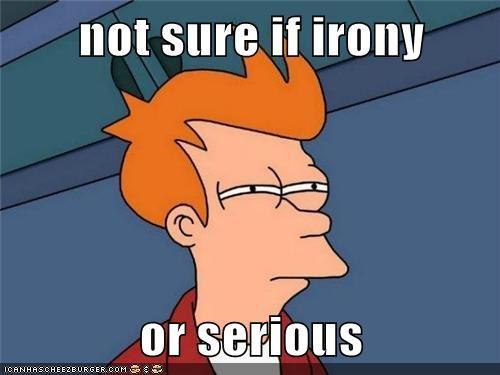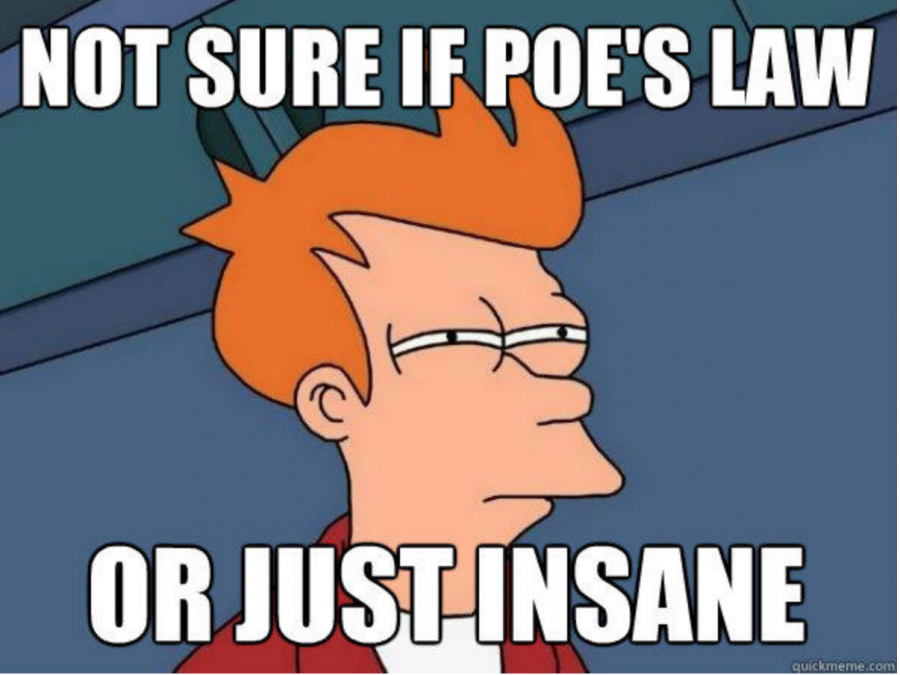
On being diagnosed with irony poisoning
"Should we all be taking ‘irony poisoning’ more seriously?", asked a New York Times article some months ago. Irony poisoning, the article suggests, “should be entered (...) into the pantheon of social science concepts” to be studied vigorously: “we are making a plea to scholars, readers and Silicon Valley elites: take irony poisoning seriously.”
So what is irony poisoning? Together with the very much related ‘down the rabbit hole’ theory of algorithmic online radicalisation, irony poisoning started appearing more and more in discussions regarding digital media and politics in the last couple of months. Concretely: irony poisoning is something that for instance the German man who tried to set on fire a house hosting refugees has been diagnosed with in the press. He was described as having “messaged near constantly with friends to share articles and memes disparaging foreigners. At first they trafficked in provocations, ironically addressing one another as ‘mein Führer.’ Over time, they appeared to lose sight of the line separating trolling from sincere hate.”

In essence, the idea is that having been exposed to and/or shared enough ironic content online, the ironic becomes sincere. Ironic jokes become beliefs, and online ironic meming starts having offline consequences such as being violent towards foreigners and setting houses on fire.
Oh, the irony poisoning
Many observers of our present-day (online) media culture have discussed the pervasiveness of irony and ironic detachment as a stance. Rosalind Gill (2007) amongst others has pointed out how irony is used “as a way of establishing a safe distance between oneself and particular sentiments and beliefs, at a time when being passionate about anything or appearing to care too much seems to be ‘uncool’.” (p. 159) When it comes to issues of gender and feminism for instance, “irony has become a way of ‘having it both ways’, of expressing sexist, homophobic or otherwise unpalatable sentiments in an ironized form, while claiming this was not actually ‘meant’.” (ibid.).
Using irony as a shield from criticism, “the extremeness of the sexism is evidence that there is no sexism” (Gill 2007: 160). The logic is that because 'we all know' that sexism is a thing of the past, we can make sexist jokes. And yet, “if we suspend our belief in the notion that it is ‘just a laugh’, we are left with a fast-growing area of media content (which profoundly influences other media) that is chillingly misogynist” (ibid.). This is when you get advertising that relies on ‘jokes’ about violence against women, for instance. Because we’re all, like, so past thinking that these things should be acceptable - it’s the ‘knowingness’ of the ironic stance that supposedly makes the difference here.
This is also where we enter what we could call the ‘intention-only internet’, where all responsibility and debate can be withdrawn from with “I apologise for the fact that my message has been misinterpreted as X. This is not at all what I intended.”
As Gill pointed out, trying to critique such content will often be met with accusations of the ‘feminist thought police’ having arrived at the scene. Apart from the feminist thought police, there is the figure of the ‘snowflake’, or the ‘politically correct’ that are now used as (online) rhetorical strategies to try and silence others. (Interestingly, one might add, it's often the people calling others snowflakes that seem to have a hard time taking any commentary on their doings.) The figures of the thought police, snowflake and PC brigade are also often accompanied by a hefty dose of intellectual laziness: “Can’t we make fun of anything anymore?!?". Such categorical retorts are easy to revert to, because in the context of ironic knowingness, “critique becomes much more difficult – and this, it would seem, is precisely what is intended.” (Gill 2007: 161).
Online is not real
When it comes to online communication, all of this is also very much related to the phenomenon described with the so-called Poe’s Law which states that online, it’s impossible to know who’s joking and who’s being serious. “If nobody knows what anyone means, then every denial is plausible.” This is how you get white supremacists for instance spreading racist memes, only to retreat to the by now all too familiar ‘it was just a joke’, it’s 'just a meme', and it’s 'just online', so it’s not to be taken seriously (see also here, in Dutch).
So the argument is that we can’t know what somebody means, “because the internet”. This is because online communication is disembodied; we don’t know who’s saying what; we don’t have facial expressions, tone of voice etc.
There is a strange assumption embedded here about offline communication: that it’s always transparent and linear, and everybody always knows what everybody else means. Everybody’s in on the joke, and there are no misunderstandings, or no use of irony as a shield when you want to say something racist or sexist for instance. It's thus because something is online that problems of 'interpretation' occur. If you think this is the case, then you seriously need to talk to some more people offline and observe the results.
What we therefore need to talk about, apart from arguing with misogynists and neo-Nazis about what their memes ‘actually mean’, is the underlying understandings here of realness and virtuality.
This is also where we enter what we could call the ‘intention-only internet’, where all responsibility and debate can be withdrawn from with “I apologise for the fact that my message has been misinterpreted as X. This is not at all what I intended.” Also here the internet seems to have unique qualities which distinguish it from every other known form of human communication. Namely: meaning is all about the intention of the person communicating, and has nothing to do with things like intertextuality (histories of meaning and use - the things we say have meanings attached to them) or the environment where the communication takes place (see LaViolette 2017 on 'cyber-metapragmatics').
It is an obvious fact of communication that people misunderstand each other and interpret things differently (from what we intended), both online and offline. That’s not a difficult point to understand - we all know this from just living our everyday lives. Meaning can be messy and debatable, but to suggest that there is a contextless context of the internet where it’s all about your intention - decoupled from social meaning which every bit of human communication is about - just doesn’t fly as an argument (see the ‘social science pantheon’ if you need evidence).
Virtual vs real
So somehow irony now seems to mean that one is not taking any kind of stance on anything - while irony, of course, is precisely that: a stance. But there’s also the question of ‘virtuality’ which is interesting here, also considering how it’s become so much part of the ongoing discussion - also when we talk about ‘irony poisoning’.
Memes in particular seem to often fall into this category; they seem to be a unique form of human communication that doesn’t ‘mean anything’, or can be made to mean anything, and if you try to point out that that they in fact do mean something, you’re from the PC brigade or a pre-millennial idiot who just doesn’t understand, "because the internet". To suggest that it doesn’t really ‘mean anything’ because "it’s on the internet", is of course crazy as a proposition. What we therefore need to talk about, apart from arguing with misogynists and neo-Nazis about what their memes ‘actually mean’, is the underlying understandings here of realness and virtuality.
With all the talk about irony, it seems only natural that the next step was to be about a 'post-irony' internet.
The question here is indeed about ‘realness’ and the status of online spaces as (non-)social spaces. As Vincent Miller points out in his The Crisis of Presence in Contemporary Culture (2016), “the online sphere is still often considered (and celebrated) as a ‘liminal’ space with its own set of norms and where the conventions of civil society are less apparent. However, the spaces of networked digital technologies are no longer liminal. They are now part and parcel of the experience of everyday life and the medium through which an increasing amount of social life is conducted; an important disjuncture now exists between the vision of the Internet as a utopian (disembodied) space free of the constraints of society and the reality of how digital technologies are ubiquitously used in everyday, materially embedded social life.”
The distinction between ‘online’ and ‘real’ is what makes it possible for us to read things such as “Until recently, it would have been hard to imagine the combination of street violence meeting internet memes” in the media. This is only hard to imagine if, like Miller suggests, we live under the delusion that what’s online is not ‘real’. It’s not only rather condescending towards the people engaged in online activities to suggest that what they have online is not ‘real’ community, ‘real’ relationships, or ‘real’ communication. Nor is it only about a rather strange kind of sociological imagination in terms of how people communicate and go about their lives. It’s also about making a confused equation between concrete and real on the one hand, and virtual with ‘unreal’ on the other hand, just because it’s not something tangible (see Miller 2011 & 2016). It also misses the entire point about the shape of social life and digital culture, and how the whole question is about social meaning, rather than about whether something online is 'real' or not.
Post-irony internet?
There’s certainly a lot to be said about taking offence online. But before the hand-wringing starts about policing online environments and (self-)censoring talk, and how it’s not possible to be transgressive and too-cool-not-to-care anymore, and how all of this is spoiling the internet, that’s not the point. If you’re asking now “Where am I able to make racist jokes if not online?”, or “Can I not post racist memes anymore?” - if that's really what rocks your boat - there are plenty of spaces online for that. Go ahead and post - but don’t expect that ‘it’s just the internet’ line should be taken as a reasoning for your behaviour. This also doesn’t equal saying that there shouldn’t be any form of transgression online - as if transgression could be banned anyway; this is just another one of these lazy arguments thrown around in debates.
With all the talk about irony, it seems only natural that the next step was to be about a ‘post-irony’ internet. Instead of ironic detachment being the thing to do, it’s about taking a 'committed stance'. It’s just that because so many of us are used to thinking that the internet is ‘not real’ that we missed that that was going on all along.
Irony poisoning as a diagnosis only makes sense if we start with the assumption that online communication doesn’t ‘mean anything’, or can mean ‘anything’. We shouldn’t be surprised to find out that people circulating racist content online would hold racist beliefs, or that they might act on these beliefs also in other contexts, including offline. We should only be surprised by the fact that people still are surprised to find out that online communication is ‘real’.
References
Gill, Rosalind 2007. Postfeminist media culture. Elements of a sensibility. European Journal of Cultural Studies 10 (2), 147-166.
Miller, Vincent 2011. Understanding digital culture. London: Sage.
Miller, Vincent 2016. The crisis of presence in contemporary culture. Ethics, privacy and speech in mediated social life. London: Sage.
